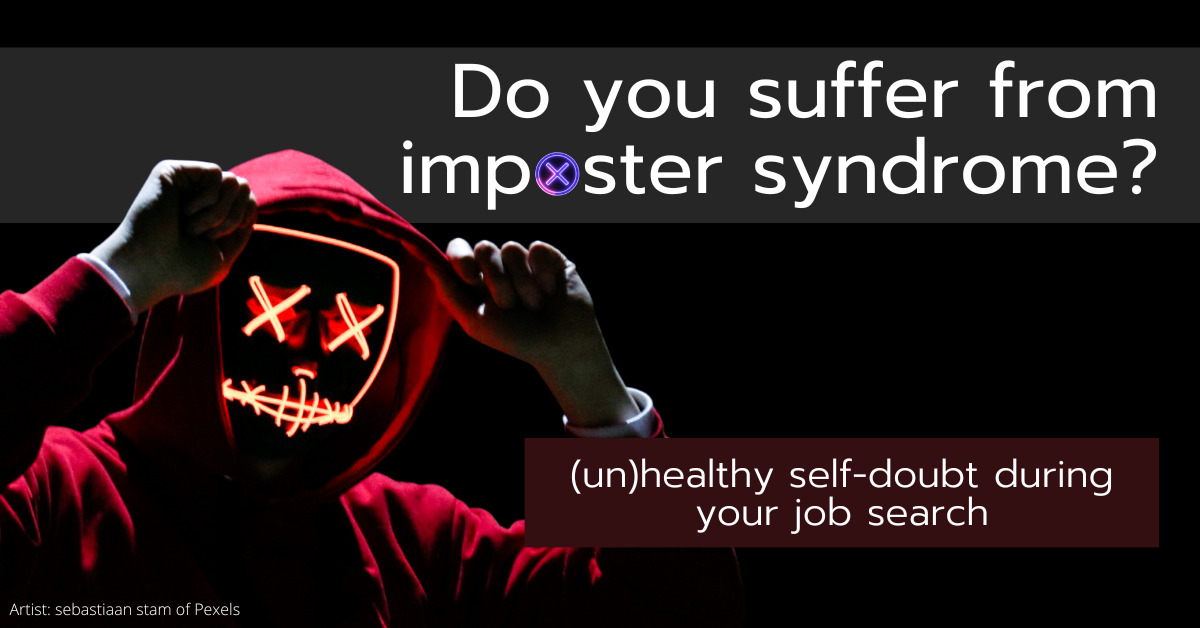
Imposter syndrome – (un)healthy self-doubt during your job search
Imagine the following scenario: you’ve been trying to get in shape for 10 months. 10 full months. And no results. You lost a couple of kilos / pounds some weeks ago, but gained them right back.
Similarly, imagine that you’ve been looking for a job for 10 months. Without results. And all the little success you’ve had always ultimately leads nowhere. In both cases, you might find yourself asking, “What’s wrong with me?”
Here’s the answer: Nothing!
Our team at Career Angels regularly hears how candidates doubt themselves as they don’t see any results or see only poor ones when looking for a job.
I really have started thinking that I’m not good enough.
Maybe something’s wrong with me?
Am I too old / over-qualified?
I know my CV says I could or should apply to this role… but I don’t feel ready.
I’m sure there are so many more candidates out there that are better than I.
Imposter syndrome
At this point, we need to highlight a couple of aspects by defining the actual feelings of imposter syndrome, present in spite of no negative feedback from the job market. In other words, a constant (or at least regular) feeling of inadequacy at work. Here’s a definition from Wikipedia:
Imposter syndrome […] is a psychological pattern in which one doubts one’s accomplishments and has a persistent internalized fear of being exposed as a “fraud”. Despite external evidence of their competence, those experiencing this phenomenon remain convinced that they are frauds, and do not deserve all they have achieved. Individuals with imposterism incorrectly attribute their success to luck, or interpret it as a result of deceiving others into thinking they are more intelligent than they perceive themselves to be. While early research focused on the prevalence among high-achieving women, imposter syndrome has been recognized to affect both men and women equally.
Our conversations with hundreds of successful C-level executives confirm that definition – though women often more openly address such thoughts & feelings than men. In the case of job hunting, imposter syndrome manifests itself in feeling like your previous experience and achievements are undeserved and overplay your actual value as a candidate.
It’s a tricky task, but learning how to silence your inner saboteur can lead to a more effective and less stressful job search process. Harvard Business Review shares some valuable tips on “Overcoming Imposter Syndrome”: Click here!
What does getting in shape and job hunting have in common?
Rejections from the job market can reinforce and multiply feelings of self-doubt. When reading our clients’ confessions in the introduction, it’s tempting to draw premature conclusions about the reasons behind their lack of success. So before we do that, we need to examine the applied methods to “get in shape” or “find a job”.
Maybe during the 10 months, someone only did a bit of light workout once a month. No consistent physical exercise. No changes to their diet. If that’s true, then your reaction is probably “Duh! Of course that’s not gonna work! No wonder they haven’t got in shape yet.”
Similarly, if a candidate only applies to job ads, does no or very little networking, doesn’t apply directly, and has contacted only 4-5 headhunters during the 10 months, you’d say “Duh! Of course that’s not gonna work! No wonder they haven’t found any job!”
Two important things to consider:
- The people in both cases could be convinced that what they are doing is a) enough and b) the right methodology.
- The feelings of frustration and not being enough are still completely real and valid.
Differentiate between two groups of candidates
a) those who receive actual, qualitative feedback during interviews
b) those who rarely get invited to interviews
Candidate a): you’re on the right track! Make sure to listen and adapt when necessary, but also learn to recognize when an opinion is just an opinion and not meaningful feedback for you to work through.
Candidate b): your concerns may be worth looking into. Try changing your strategy / methodology – but never yourself!
Read FastCompany’s article on “When you should listen to your self-doubt—and when you shouldn’t”: Click here!
Additionally, check out this blog post for concrete pieces of advice on the job search strategy and process, including:
- How to prepare a CV for humans and a CV for ATS (job ads!)
- How to use your network
- How to approach recruitment firms
- How to use the direct approach channel
If you are an experienced manager experiencing self-doubt, get in touch with Career Angels for a free 20-to-30-minute Career Consultation to discuss anything career-related:
- You can book a session via this link or by sending an email to Contact@CareerAngels.eu | Subject: Self-doubt



